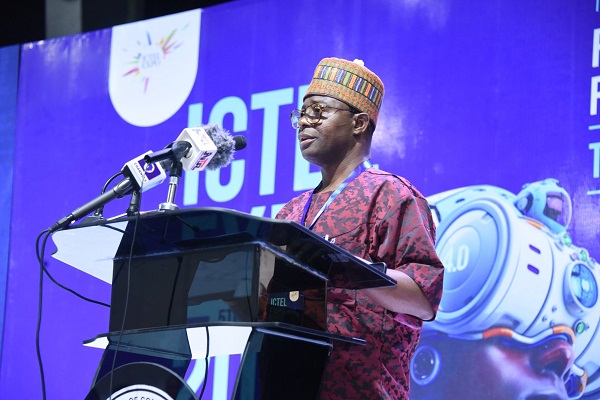Telecom
NCC moves to ensure MNOs networks are LTE Compatible

In line with Nigerian Communications Commission’s(NCC) resolve that Nigeria is not left behind in the advancement of new technology in Information and communications technology (ICT) service delivery the Commission has begun move to ensure that all mobile network operators (MNOs) network in the country are Long Term Evolution (LTE)-compatible.
Nigeria CommunicationsWeek reports that Long-Term Evolution (LTE) is a standard for wireless broadband communication for mobile devices and data terminals, based on the GSM/EDGE and UMTS/HSPA technologies. It increases the capacity and speed using a different radio interface together with core network improvements.
Also LTE is the upgrade path for carriers with both GSM/UMTS networks and CDMA2000 networks. The different LTE frequencies and bands used in different countries mean that only multi-band phones are able to use LTE in all countries where it is supported.
Prof. Umar Garba Danbatta, Executive Vice Chairman/CEO Nigerian Communications Commission (NCC), who was represented by Ismail Adedigba, Head, Information and Reference Consumer Affairs Bureau stated this at the ongoing 5th edition of ICTEL EXPO 2019, holding at the Landmark Event Center, Lagos.
According to him, “we are ensuring that all new sites to be built by the mobile network operators (MNOs) are Long Term Evolution (LTE)-compatible.
“We also strive to ensure implementation of harmonised Right of Way (RoW) charges on state and federal government highways at the cost of N145 per linear meter to encourage faster rollout of telecoms infrastructure.
“We are also working with relevant stakeholders to ensure elimination of multiple taxation and regulations; encourage spread of 3G coverage to, atleast 80 per cent of the Nigerian population over the current 56.4%of the population covered with 3G networks.
“Furthermore, the Commission is encouraging the operators’ upgrade of their 2G base transceiver stations (BTSs) to 3G; spread of Fifth Generation (5G) to, at least five per cent of the population; spread of 4G/LTE services to 100 per cent of the population with a minimum broadband speed of 1.5 megabit per second (Mbps); and finally, deployment of at least one Access Point of fiber with a 10 gigabyte per second (Gbps) capacity in all the 774 Local Government Areas (LGAs) of the Federation through the INFRACO.”

L-R: Representative of the Permanent Secretary, Ministry of Technology, Mr Chima Igwe, Immediate past president, Lagos Chamber of Commerce and Industry, (LCCI), Dr Nike Akande, Director of Information Communication Technology (ICT), Ministry of Communications, Mrs Moni Udoh , President, LCCI, Mr Babatunde Ruwase and Chairman, trade promotion board, Gabriel Idahosa, at the Opening ceremony of the LCCI 5th edition of ICTEL EXPO 2019, in Lagos, on Tuesday
He noted also that fourth industrial revolution will have the capacity to enhance every facet of our lives, and not just the workforce alone.
The NCC boss revealed that the technologies of the fourth industrial revolution have the potential to connect everything into one giant communicating network.
Danbatta said “the Fourth Industrial Revolution’s technologies, such as AI, augmented reality, robotics, Cloud computing, Big data, Over-the-Top (OTT), Block-chain technology, advanced security systems and 3-D printing, etc., are rapidly changing the way humans create, exchange, and distribute value.
“As with previous revolutions, this will profoundly transform institutions, industries, and individuals.
“More importantly, this revolution will be guided by the choices that people make today: the world in 50 to 100 years from now will owe a lot of its character to how we think about, invest in, and deploy these powerful new technologies.
“Suffice it to state that the Fourth Industrial Revolution involves a systemic change across many sectors and aspects of human life and as such, the crosscutting impacts of emerging technologies are even more important than the exciting capabilities they represent.
Engr. Gbenga Adebayo, President of Assocation of Licensed Telecommunications Operators of Nigeria said that every industrial revolutions we have witnessed in the time past was associated with one form of technical innovation or the other, noting that these technical innovations were protected by the government before it thrived
He added however, that in Nigeria, the case is not the same, that government is not doing enough to protect stakeholders in the industry.
Adebayo who was represented by Mr Aremu Olajide said every revolution started with an innovation, an enabler and they complement each other but unfortunately in Nigeria the challenges that exist does not encourage for the right infrastructure to be provided.
He noted that if the challenges in the information and Communications Technology sector is not addressed the quest to be part of the fourth industrial revolution will be a mirage.
He explained that every enabler in the sector should complement each other, adding that if we don’t get it correct at any stage, we cannot move to another stage.
He reiterated that for us to get it, infrastructure must be provided at all level of the economy.
According to him, “Government should declare these enablers a national critical infrastructure, create an environment for the youth to be innovative, create a smart city initiative, find lasting solutions to protecting infrastructure.
“All these put in place will ensure a conducive environment for 4IR to thrive,” he said
Telecom
TikTok, Instagram Blamed in US Youth Suicide Lawsuit

Major social media giants Meta Platforms, TikTok and Alphabet’s YouTube will face a landmark jury trial this week in Los Angeles County Superior Court over allegations that their addictive designs have fuelled a youth mental health crisis, marking the first such case to reach this stage.

Social Media
The pivotal personal injury lawsuit centres on a 19-year-old Californian woman identified as K.G.M., who claims her childhood immersion in Instagram, Facebook, YouTube and TikTok—engineered with endless scrolls, autoplay videos, notifications and algorithms—sparked severe anxiety, depression and suicidal thoughts.
Dozens of similar suits have surged since 2022 from families, schools and states, accusing the firms of burying internal research on teen harms while prioritising ad revenue through youth-targeted engagement hooks, despite Section 230 protections for user content.
Plaintiffs seek damages and design overhauls, arguing platforms bypassed parents and preyed on vulnerable kids; defendants counter there’s no clinical “social media addiction” diagnosis, no proven causation—kids with issues often use less—and they’ve added safeguards like parental controls and time limits.
Echoing Australia’s under-16 bans, the trial will scrutinise thousands of internal documents, expert testimonies and K.G.M.’s story, potentially expanding tech liability amid debates where studies show complex links, not direct causation, between screen time and disorders like eating issues or self-harm.
A win could mandate warning labels, age gates or algorithm tweaks, reshaping global platforms as U.S. Surgeon General advisories and global scrutiny intensify pressure on Big Tech to prioritise child safety over profits.
Telecom
Meta Tests Paid Subscriptions Across Instagram, Facebook, WhatsApp

Meta is gearing up to trial paid subscription services on Instagram, Facebook, and WhatsApp, aiming to diversify revenue streams beyond advertising while maintaining free core access for all users.

Meta
The subscriptions will offer enhanced tools tailored for everyday users, creators, and businesses, including advanced content creation, sharing, and workflow features distinct from the existing Meta Verified verification program. Unlike a uniform rollout, Meta plans varied testing formats per app to match diverse audiences, experimenting with feature bundles based on user feedback to refine the model.
A key element involves integrating Manus, the autonomous agent firm Meta acquired for $2 billion in December, into these apps alongside its enterprise sales. Manus enables complex task automation with minimal input, with early signs like Instagram shortcuts already spotted by reverse engineer Alessandro Paluzzi.
Video tools feature prominently: Meta’s Vibes short-form video generator in the Meta AI app shifts to freemium, where paid tiers unlock higher monthly creation limits beyond the free baseline. On Instagram, subscriptions could enable unlimited audience lists, non-follower tracking, and anonymous Story views, though specifics for Facebook and WhatsApp remain under wraps.
Drawing from Meta Verified’s 2023 launch—which provides badges, support, and protection mainly for creators—these broader plans target wider appeal amid industry shifts. Ad growth slows against TikTok competition, while Snapchat+ boasts 16 million subscribers at $3.99 monthly, proving demand for value-driven paid perks despite subscription fatigue risks from streaming and storage fees.
Meta will phase tests gradually, prioritizing feedback to shape long-term viability without alienating free users.
Telecom
New Investment Fund Targets Acceleration of Emerging Technology in Nigeria

The International Rescue Committee (IRC) has announced the formation of Airbel Ventures, a new humanitarian impact investing fund aimed at accelerating the introduction and scaling of breakthrough technologies in crisis-affected communities.

The fund will invest in companies whose ideas have the potential to change humanitarian response, including digital infrastructure for frontline health systems and climate-resilient agriculture.
The launch of Airbel Ventures follows a period of rapid innovation at the IRC, despite the humanitarian sector facing record funding cuts.
In the past year, the IRC’s Airbel Impact Lab has advanced more than twenty Artificial Intelligence (AI) and technology initiatives—from anticipatory action tools powered by climate and vulnerability data, to frontline service delivery using safe, orchestrated AI systems, to breakthrough diagnostic tools for emerging diseases.
Airbel Ventures’ first impact investment is in Signalytic, a company delivering solar-powered computing devices that ensure reliable electricity and connectivity for remote health facilities.
Following the investment, the IRC will pilot Signalytic’s technology with its Nigeria Health team, demonstrating the viability of next-generation digital infrastructure in humanitarian settings.
“We know breakthrough solutions already exist—what’s missing is the path to scale in humanitarian contexts,” said Dr. Jeannie Annan, Senior Vice President for Research & Innovation at the IRC and head of the Airbel Impact Lab.

 News2 days ago
News2 days agoLIRS to Invoke NTAA to Recover Unpaid Taxes from Bank Accounts, Others

 News2 days ago
News2 days agoAnambra Cuts Monday Pay to Kill Sit-at-Home

 E-Financial2 days ago
E-Financial2 days agoFirst Asset Management Receives Upgraded Ratings from Agusto &Co and DataPro

 General News2 days ago
General News2 days agoNigeria Treats Religious Violence as Attack on State – NSA Ribadu

 E-Financial2 days ago
E-Financial2 days agoNIBSS, Others Flag 13,417 Nigerian Fraudsters on Person of Interest Portal

 E-Financial2 days ago
E-Financial2 days agoCBN Prepares Fresh Debit Card Rules to Improve ATM Services

 News1 day ago
News1 day agoTech Executives Double Down on AI, Talent and Adaptive Strategies to Lead in the Intelligence Age

 E-Financial1 day ago
E-Financial1 day agoCBN Upgrades Licences of Opay, Moniepoint, Kuda, Palmpay, Paga to National Status


























